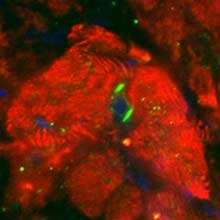April 16, 2010 report
Peptides Can Repair Damaged Heart Tissue

(PhysOrg.com) -- A startup company, CardioHeal, based in Brookline, MA has developed peptide drugs that can speed up the growth of new heart muscle cells.
The startup is headed by Roger Hajjar, director of the Cardiovascular Research Center at the Mount Sinai School of Medicine, in New York, and Bernhard Kuhn, a cardiologist at Children's Hospital Boston, both aim to change the way how heart disease is treated.
A pair of peptides have been identified that can stimulate new cell growth. An experiment was conducted on rodents induced to have heart attacks. A similar test with peptide, periostin was also conducted on pigs induced to have heart attacks. Both animals provide a good model for testing because they have similar size hearts to that of humans. Results show by injecting the peptide into the lining around the heart made it much better but not back to normal.
Heart attack victims currently get medication, such as beta blockers, to help the heart beat and require surgery to clear blocked arteries. But neither one regenerate’s new heart muscle after a myocardial infarction.
CardioHeal’s method is similar to stem-cell therapy which is already being tested on humans. Scientist is currently working on different ways of harvesting and delivering stem cells to patients with heart disease. Clinical trials have mixed results with no definitive way of treatment. Transplanted cells have a difficult time adapting to the patient’s heart cells.
The benefit of cell transplant can only be successful when it can stimulate innate growth. Peptides may prove to be a better treatment in certain conditions such as an enlarged heart where the problem is lack of viable, contractile heart muscle cells.
Before CardioHeal can start clinical trials on patients, they still have some unanswered questions they need answered. One, what is the least invasive way of delivering the peptides to the patient’s heart? Two, when can it be delivered to the patient after they suffer a heart attack? These and other extensive safety testing need to be done before human trials can be started.
© 2010 PhysOrg.com














